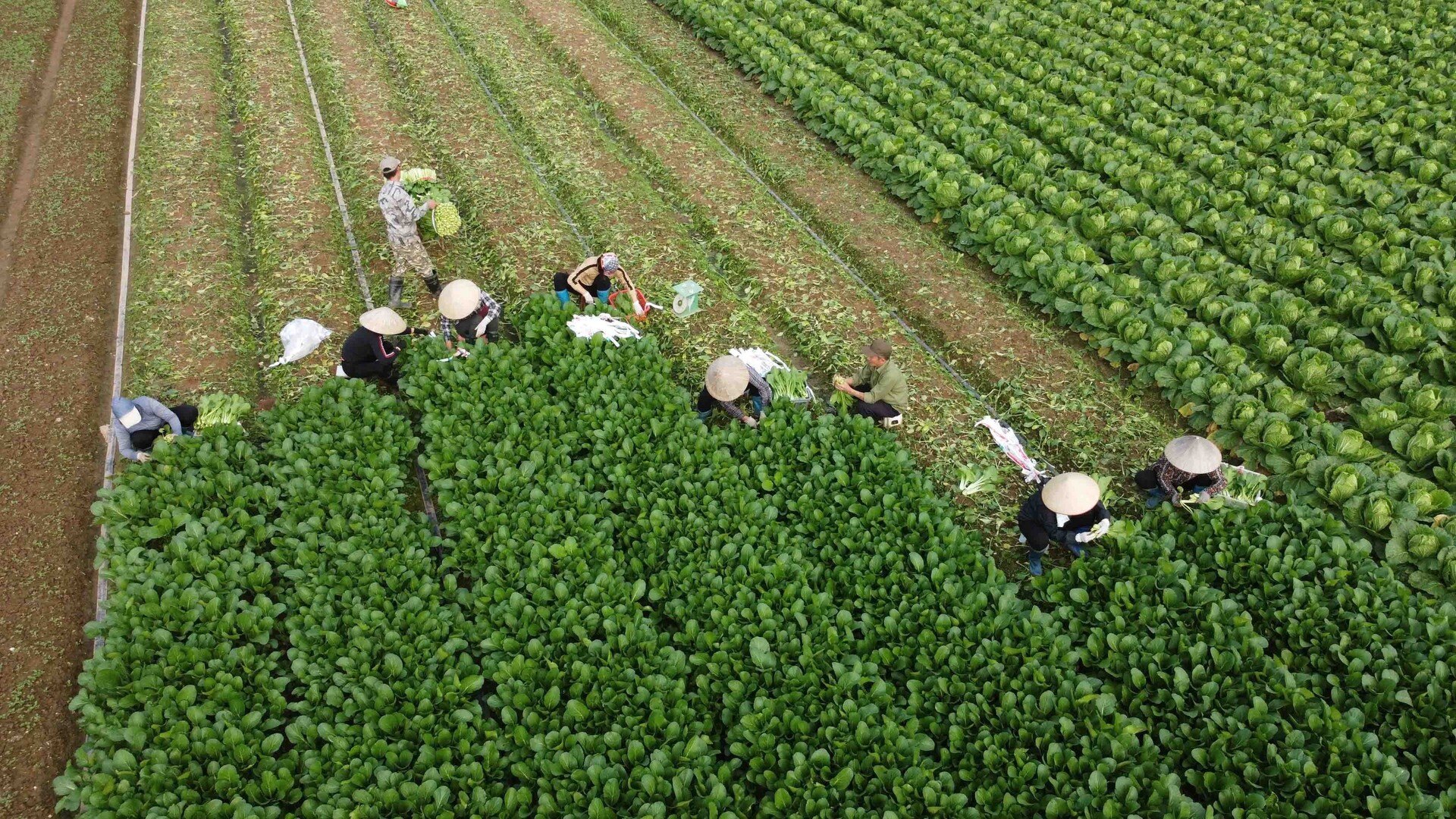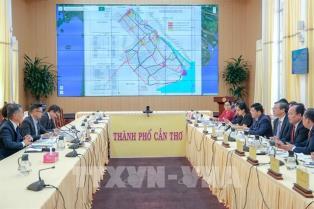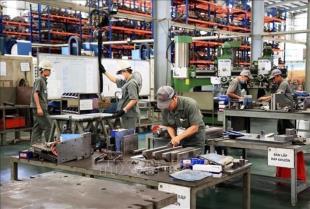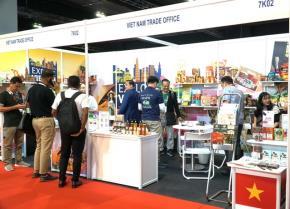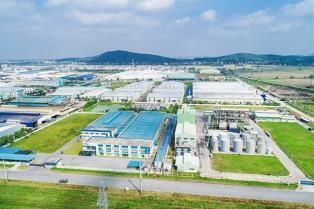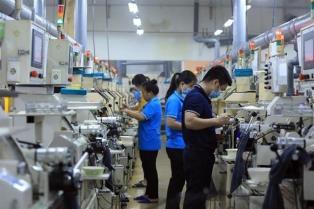Hà Nội is stepping up digital transformation efforts to build a transparent food supply chain, a move seen as crucial to meeting growing consumer demand and driving sustainable, efficient agricultural growth.
HÀ NỘI — Hà Nội is stepping up its digital transformation efforts to create a transparent food supply chain, a move seen as vital to meeting growing consumer demand while driving sustainable and efficient agricultural growth.
According to Nguyễn Thành Trung, Deputy Head of the Section of Quality and Market Development under the municipal Department of Agriculture and Environment, Hà Nội holds a strategic geographic and economic position as one of Việt Nam’s two major growth engines and a key consumption hub in the northern region.
Hà Nội has extensive cultivation areas, including 155,000ha of paddy, 33,000ha of vegetables, and 24,000ha of perennial crops. The capital also has about 1.25 million pigs and 36 million poultry — the highest figures in the country — along with 128 livestock zones. It is home to more than 11,000 agro-fishery producing, processing and trading facilities and 250 exporters.
The city’s agricultural production ranks among the largest nationwide, Trung said.
However, local production can meet only around 20–70 per cent of demand for its more than 10 million residents, depending on the product, with the rest supplied by other provinces and imports.
Ensuring food quality, hygiene and safety remains a priority, Trung noted, stressing the need to build transparent supply chains, promote organic and VietGap farming, and adopt high-tech, ecological and sustainable production models.
In recent years, municipal authorities have tightened inspections and post-checks to prevent violations while fostering a healthy business environment for agricultural enterprises, he said.
Developing safe, transparent and sustainable value chains for agro-forestry-fishery products is an inevitable trend that will lay the foundation for green growth and the international integration of Việt Nam’s agriculture, said Phan Thị Phương Thảo from the Việt Nam Academy of Agriculture.
Thảo said Việt Nam has an enormously potential food market, with food processing revenue projected at US$479 billion in 2024, but food quality and safety remain matters of concern.
Another challenge is that most of the added value lies in processing and distribution while producers receive the least, she said.
Developing the agricultural value chain should focus on three main pillars — safety, quality and traceability; sustainability, circularity and low emissions; and linkages among farmers, businesses, scientists and the Government.
She urged stronger Government support for green credit, land access, digital transformation and traceability, along with more communication and awareness-raising campaigns.
Enterprises should also invest more in preservation, deep processing and brand development while strictly complying with technical standards to ensure consistent quality, she added.
In need of support

Hoàn Văn Thám, chairman of Chúc Sơn Safe Fruit and Vegetables Cooperative in Chương Mỹ Ward, said that the process of applying for product traceability systems remains complicated, pushing up costs, and making it hard to compete with produce at traditional markets.
Thám called for support to help cooperatives connect to national digital platforms to facilitate product traceability.
It is also necessary to strengthen market management to prevent low-quality and unclear-origin products in order to protect consumers and genuine producers, he added.
Agricultural enterprises still face difficulties and rising costs in quality management, said Nguyễn Thị Mai, director of food company Vinh Hà in Đại Xuyên Commune.
For clean-food producers, the costs of inspection, certification and labelling are a major burden, she said, adding that if fully included in prices, clean vegetables could not compete with others.
Mai called for Government support in capital and certification fees for genuine producers, as well as investment in high-tech farming, processing and preservation facilities to ensure quality control. Support must be provided throughout the entire value chain to avoid disruptions, she said.
Nguyễn Tuấn Hồng, a representative from Bắc Hồng Clean Vegetable Production and Consumption Cooperative, said that most agricultural cooperatives and businesses are small-scale with limited financial capacity, making it difficult for them to accumulate land for production.
He called on local authorities to facilitate linkages between cooperatives and farmers to form large-scale and high-tech production zones.
Đàm Thị Dịu, director of Kinh Bắc Company, said that it is necessary to have a flexible quality verification mechanism suitable for small producers while maintaining transparency.
“Traceability is not easy but it is a must-do to protect both producers and consumers,” said Nguyễn Trọng Long, director of Hoàng Long Cooperative, urging the Government to support the development of processing and preservation plants near production areas to reduce costs and ensure quality.
Communication should also be enhanced to raise consumer awareness of clean food so that enterprises feel confident to expand production, he said.
Đào Quang Vinh, director of Vinh Anh Food in Thường Tín Commune, said that it is necessary to develop a unified traceability system for the meat industry, from production and processing to distribution, to enhance transparency and reduce the financial burden of separate investments.
Vinh also proposed that the city introduce policies to support clean-food producers to connect with supermarkets, restaurants and schools to ensure stable consumption markets.
Vũ Sỹ from Mê Linh Commune’s Economic Office said that the coordination model between enterprises, the Government and producers must be promoted to increase efficiency and facilitate the formation of transparent agricultural value chains.
Digital transformation
According to Trương Văn Nhung, Deputy President of the Hà Nội Farmers’ Union, transparent traceability and quality control are the most important ways for farmers to affirm the value of their agricultural products.
The most important factor now is helping farmers understand and voluntarily adopt safe production practices, with the mindset that this is not only for income but also a social responsibility.
The Hà Nội Farmers’ Union will continue to support its members with access to capital, technical guidance, business linkages and participation in safe and sustainable value chains, Nhung said. The union will promote pilot models of 'happy farmers' to encourage the production of clean, high-value agricultural products that protect health, the environment and support a greener, more sustainable agricultural sector for the capital.
Tạ Văn Tường, Deputy Director of the Hà Nội Department of Agriculture and Environment, said that the capital will continue to develop plans, mechanisms and new policies aimed at ensuring safe and transparent food supply chains to meet rising consumer demand and foster green, sustainable and efficient agriculture.
The department will work closely with relevant ministries and agencies to improve mechanisms and policies to enhance food safety management, promote deep processing and expand markets.
Efforts will focus on agricultural planning, including slaughtering and farming, as well as promoting high technology, ecological and organic agriculture, he said, adding that businesses and cooperatives will be encouraged to adopt advanced quality management systems such as VietGap, HACCP and ISO 22000.
Importantly, it is vital to accelerate digital transformation across entire value chains to ensure quality control and origin transparency, Tường said.
The department will also strengthen trade promotion and linkages for key agricultural products of the capital, OCOP items and specialties at home and abroad, he said.
Besides strictly complying with food safety regulations, Tường urged enterprises and cooperatives to develop brands, enhance marketing and increase their presence on e-commerce platforms.
“Digital transformation, transparency and value chains are not only market requirements but also the key to ensuring farmers’ happiness, consumers’ trust and the long-term development of Hà Nội’s agriculture and environment,” Tường said.
Experts also urged the Hanoi Support Centre for Enterprise and Investment Promotion (SCE) to provide support to small and medium sized enterprises (SMEs) and business households so that they can play their roles in developing safe and transparent food supply chains in the capital city. — VNS
- Tags
- food supply chain
- Hà Nội

